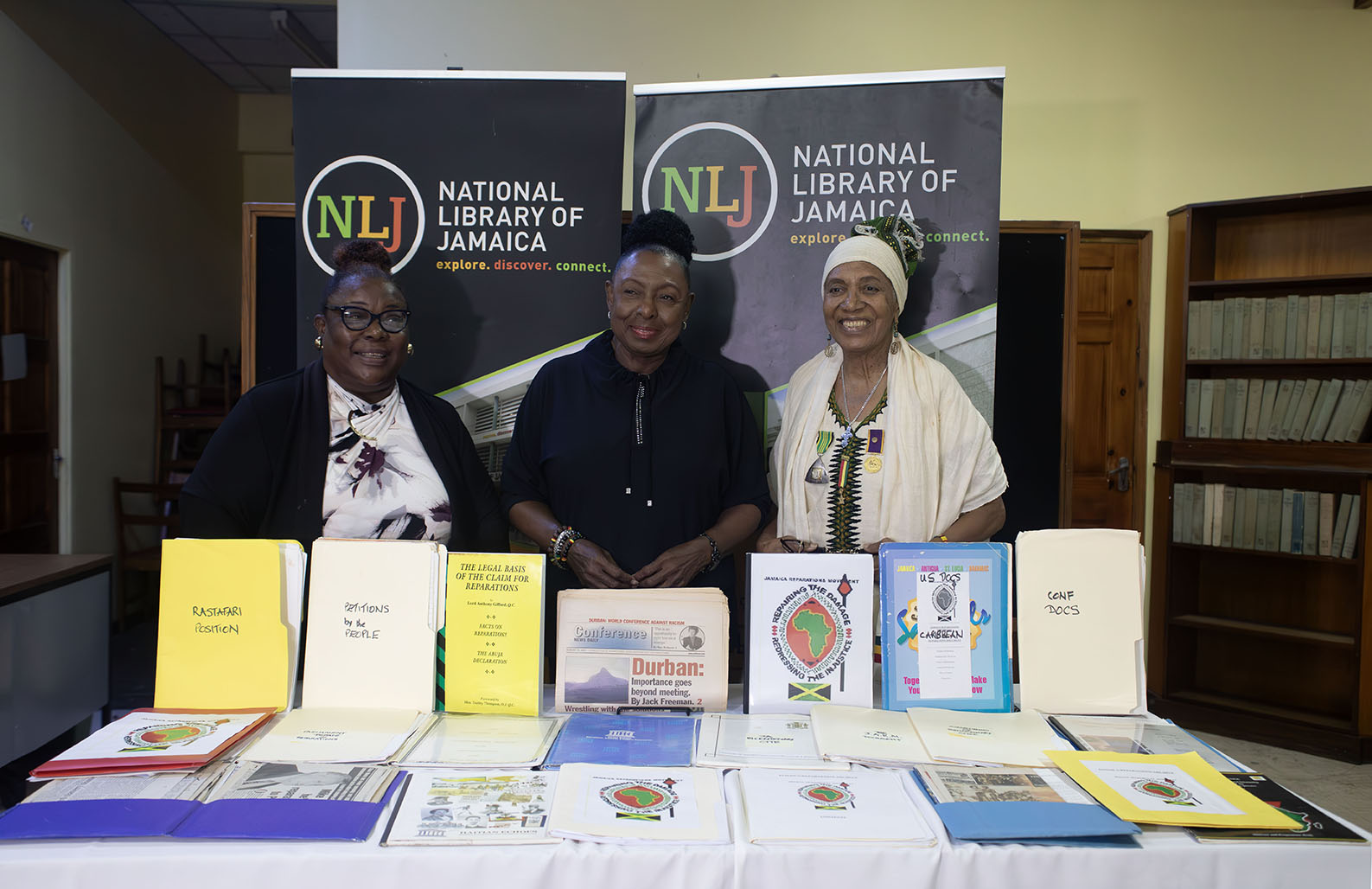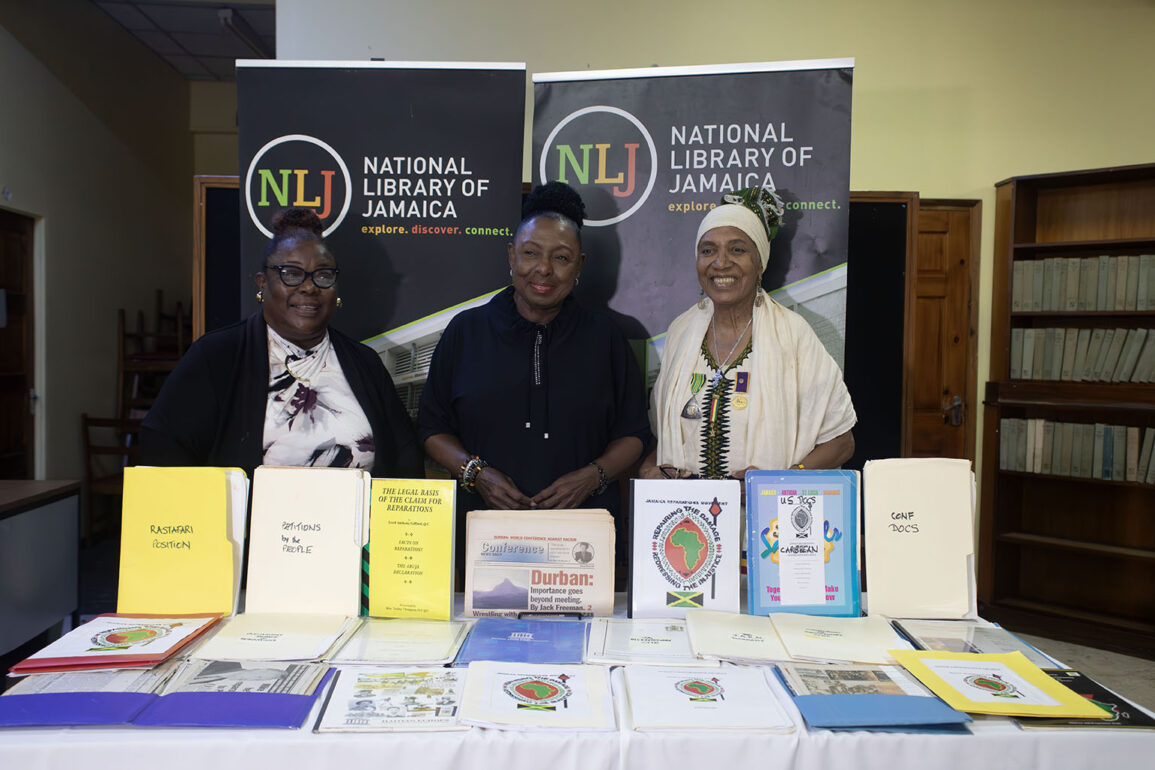
It is with great pleasure that I hand over the Jamaica Reparations Movement Archive of papers, booklets, newspapers and other materials I have collected since first starting the J.A.R.M in 2001.
At that time I had just attended the UN World Conference Against Racism in Durban, South Africa where the overwhelming number of interventions on Reparations from the global delegations made the Conference organizers set up a separate plenary to deal with it all. I was appointed to that plenary, I am glad to say, because Reparations was the reason I went to the Conference.
On return to Jamaica, I decided to keep alive the connections and good work on reparations we had made at the Conference, and so the JA.R.M began first as a website, then as an actual committee of persons. I wrote out a Solemn Declaration of what Jamaica’s position and Call for Reparations should be, with Objectives, Structural Proposals and a Plan of Action. Professor Verene Shepherd took a bold step and made available a University of the West Indies lecture hall for me to hold the first meeting, where 30 persons committed to Reparations attended and signed the Solemn Declaration as our Conference document. Prof. Shepherd became a leading reparations activist.
The J.A.R.M. became the public voice of the Jamaica reparations movement, and I worked single-handedly on keeping the flame alive for 7 years until I could no longer do the work by myself. In 2008 I handed over the Solemn Declaration to then-Minister of Culture Olivia Grange and asked her to use it to take charge of Reparations. She asked me to help her set up a Parliamentary Committee to discuss the steps forward for the Government to endorse reparations, after which she set up the National Council on Reparations. At that point I officially stepped away from leadership of the reparations movement, continuing to support the cause only as an individual, with articles in the press and social media at home and abroad.
In handing over the JARM archive to the National Library of Jamaica, I now officially end my public advocacy on reparations. This collection of papers provides some rare documents that show in print the work that has been done from Rastafari started calling for “REPATRIATION WITH REPARATIONS” in the 1930s. Their voices were ignored, but when the call was printed on paper, in newspapers, books and conference documents, it could not be ignored. Here is the call, on paper, endorsed by a wide variety of writers, speakers, leaders and activists.
This archive of documents represents a record on paper of the work done in these first years of Jamaica’s official call for reparations, and I am happy that the collection will now be available to students and researchers on reparations, and on Jamaican political history, for all time.
I have seen the official work done by the NRC take significant steps forward, including becoming part of the CARICOM Reparations Commission that unites Caribbean islands. Over the years more and more European organizations have recognized and admitted their share of blame for the ills of Caribbean chattel slavery, and taken steps to pay reparations. Churches, universities, businesses, shipping companies, industries and individuals have made apologies and payments as reparations, and more continue to be added to the list. I hope it will not be long before the final step is taken when the British government and monarchy take the rightful action awaiting them.
As I leave the movement in good hands, I am warning us to beware of those who have tagged along, without connections to slavery or reason to support reparations, and whose actions seem likely to bring the movement into disrepute and ridicule, perhaps deliberately intending to derail our cause. I express my concern and ask us to be wise and watch them carefully. My last article on Reparations is about this situation, and I add it to the JARM Archive for all who wish to read it.
Otherwise, I take a well-earned rest from my activism for Reparations at home and abroad. Instead I plan to add my voice and connections to matters that more directly concern me at home in my beloved Jamaica. Education needs help to finally provide the nation with citizens whose academic capacity is as internationally renowned as the achievements of our musicians and athletes. I plan to help where I can.
Thank you Professor Verene Shepherd and Thank you Minister Olivia Grange for all you both have done for Reparations. I leave Reparations in good hands.
Thank you Beverly Lashsley and the staff of the National Library of Jamaica for providing a home for the JARM Archive. I leave the Reparations Archive in good hands.
I am off to fight a new battle.
Barbara Blake Hannah


